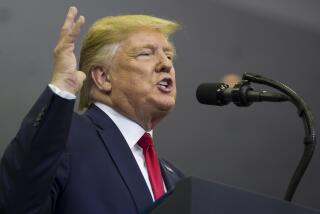Thatcher Urges Reagan to Take Leader’s Role
- Share via
WASHINGTON — British Prime Minister Margaret Thatcher, clearly concerned that the Iran- contra affair may be sapping the strength of the Reagan Administration, said Friday that the Western allies “need American leadership” to take advantage of historic opportunities for arms control and a stable world peace.
Although Thatcher was careful to emphasize the positive in her public remarks, she left little doubt that during the 50 minutes she spent alone with President Reagan at the White House, she urged the President to get on with the challenges posed by Mikhail S. Gorbachev’s Soviet Union.
‘Historic Changes’
Standing beside Reagan in bright sunshine outside the White House, Thatcher said: “Great changes are taking place in the world, including historic changes in the Soviet Union. It is a time of unprecedented opportunity if we are wise and skillful enough to grasp it.
“Now more than ever, we need American leadership, and your President is uniquely able to give it, and will give it. America and Europe together can secure that more stable and peaceful world which has been our hope and our dream if we face up to the challenges ahead.”
Thatcher, elected to a third term last month, spent less than 24 hours in Washington.
Before she left London, the prime minister and her aides told both American and British reporters that she hoped to refocus Reagan’s attention from the Iran-contra affair to the larger world issues, because there was no way the West could fill an American leadership vacuum. In her public comments in Washington, however, she was careful to make her points without offering any criticism of the President.
“If America does not take the leadership role, . . . she injures the interests of the free world,” Thatcher told one television interviewer. “America is the flagship of freedom. . . . She must sail into the sunrise and not look back at things that may or may not have happened.”
Agreement on Key Issues
Reagan and Thatcher, in their public comments following their private meetings, said they were in total agreement on Western strategy for arms control, the Arab-Israel peace process and an expected U.N. effort to end the nearly seven-year-old Iran-Iraq War. But there were some subtle differences in emphasis.
Thatcher, for instance, said she could see no evidence of Soviet foot-dragging in the Geneva arms control talks. Moreover, she said, the West should be in no hurry to complete a treaty because of the importance in being meticulous in drafting the details, especially those concerning verification.
“Verification is tricky, and that’s what’s taking the time,” she said.
Reagan Administration officials, by contrast, have accused the Soviet Union of pulling back from a near-certain agreement to remove medium- and short-range nuclear missiles from Europe.
Soviet Stalling
A senior U.S. official said earlier this week that Moscow was apparently stalling to increase the pressure on the West. This official said the Soviets might hope that European members of the North Atlantic Treaty Organization would become impatient for an agreement and urge Washington to make additional concessions.
The official said that when agreement appeared to be within reach in the past, the Soviets “back off to see if they can test alliance solidarity. It might go on all summer.”
Following Thatcher’s talks at the White House, the same official said the analysis of Soviet stalling was not the only one possible. But he added, “The pace (of the arms talks) has changed--it has slowed.”
Reagan and Thatcher said they agreed completely on a two-step proposal to increase the international pressure on Iran to begin peace talks with Iraq.
Two-Step Proposal
The first step calls for the U.N. Security Council to meet soon, probably next week, to order an immediate cease-fire in the gulf war. Iraq has said it would heed such a call, but Iran has said it would not.
Under the second step, the Security Council would impose sanctions--such as a total arms embargo--to punish either side for failure to comply.
Reagan said he and Thatcher agreed that U.N. Secretary General Javier Perez de Cuellar should “personally undertake a mission” to mediate a cease-fire between Iran and Iraq. A senior U.S. official said later that Perez de Cuellar’s effort was part of the previously announced U.N. Security Council plan.
Supports Reflagging
Thatcher said she supports Reagan’s plan to re-register 11 Kuwaiti tankers under the American flag, but she made it clear that Britain did not plan to increase its own activities in the Persian Gulf. Kuwait asked last week for permission to re-register some of its remaining ships under the British flag, but Thatcher’s government brushed aside the proposal as a commercial issue.
Nevertheless, Reagan said Thatcher had reminded him “that the Royal Navy has been providing protection for British ships in the gulf for some time.”
In her response, Thatcher said, “As you said, Mr. President, we are each protecting our own merchant ships and tankers.” She seemed to emphasize the word “own.” Britain has three warships in the gulf.
Thatcher left Washington in late afternoon for Jamaica, where she planned to participate in ceremonies marking the 25th anniversary of that nation’s independence from Britain.
More to Read
Sign up for Essential California
The most important California stories and recommendations in your inbox every morning.
You may occasionally receive promotional content from the Los Angeles Times.













